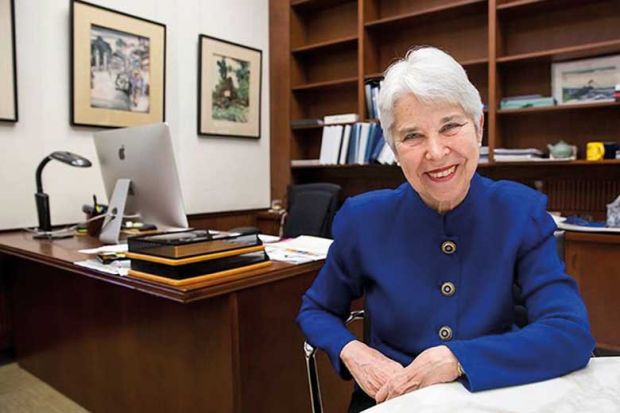The head of one of the US’ leading higher education institutions has warned business representatives that it is bordering on “dangerous” to argue that universities exist only to prepare students for the workplace.
Carol Christ, chancellor of the University of California, Berkeley, made the remarks during a debate between corporate bosses and university leaders in Davos, Switzerland, which flipped on its head the well-worn narrative about universities failing to prepare students for the world of work.
Instead, university leaders castigated businesses for not doing enough to educate their employees.
Professor Christ told attendees, including representatives of IBM and Microsoft, that it was “limiting and almost even dangerous to say that the university should only be about professional training”.
A grounding in the liberal arts, for example, allowed scientists to fluidly “change their frame of reference” and creatively attack scientific problems, she said.
Universities such as Berkeley, Professor Christ told delegates, were under pressure from Silicon Valley to produce more students with doctorates in economically critical areas such as computer science and artificial intelligence.
But a university is a “repository for all knowledge”, she stressed, and said that she worried about the “distorting effect” of this pressure “for certain disciplines to the sacrifice of others”.
Other university leaders also voiced scepticism that they could or should live up to the immediate demands of companies. Suzanne Fortier, vice-chancellor of McGill University in Montreal, said that in Canada “we used to hear that, all the time, from industry, that students are not ready [for work]. And we used to say: they may not be ready exactly for tomorrow, but they have to be ready for the long term.”
Brian Schmidt, vice-chancellor of the Australian National University, said that the struggle for universities was that their students were often hazy about which jobs they would end up in, be it government, finance or a non-governmental organisation.
It was therefore tricky to prepare a student both for their first job as well as “the job after the job after”, he pointed out, so programmes on offer inevitably had to be somewhat “generic”.
The discussion on “Redefining Talent”, hosted by ETH Zurich and Times Higher Education and held alongside the World Economic Forum, an annual Alpine gathering of political and business figures, also turned to how businesses were failing universities.
Professor Schmidt accused Australian firms of doing the “bare minimum” to educate their workers.
Businesses assumed that it was the government’s role to “educate and train” youngsters for employment, he said; companies had even demanded that universities pay them to help workers learn on the job.
Australian industry struck such an attitude because it can reap healthy profits from mining, whereas in countries such as Switzerland with fewer natural resources, businesses had to invest in people through education instead, he argued.
Berkeley’s Professor Christ also complained that corporations were firing large parts of their workforce only to hire fresh workers with different skills. Instead, they should think about how to “construct training or reskilling programmes within the industry itself that enable workers to move on to different careers”, she said.
david.matthews@timeshighereducation.com
Watch more coverage of the discussion
Register now for the Times Higher Education World Academic Summit at ETH Zurich on 10-12 September, with the theme ‘How talent thrives’.
POSTSCRIPT:
Print headline: Skills obsession ‘dangerous’
Register to continue
Why register?
- Registration is free and only takes a moment
- Once registered, you can read 3 articles a month
- Sign up for our newsletter
Subscribe
Or subscribe for unlimited access to:
- Unlimited access to news, views, insights & reviews
- Digital editions
- Digital access to THE’s university and college rankings analysis
Already registered or a current subscriber?








